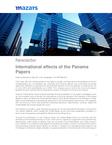
International effects of the Panama Papers
First: Days after the media scandal of the Papers scandal, and days before the deadlines to file the complementary tax normalization tax, Colombia and Panama signed a tax information exchange agreement (linked to an agreement to avoid double taxation) which will operate -by requirement- as of June 2016 and automatically as of 2018. This measure put an end to the long confrontation between the two countries due to Colombia's inclusion of Panama in the list of tax havens.
Second: Following the aforementioned scandal, through publications in European newspapers such as The Guardian and Le Monde, the international community learned of the intention of the United States to reform its federal tax and corporate regime, which allows States such as Delaware, Florida, Wyoming and Nevada to enact state tax regimes for LLCs that are typical of tax havens. This, together with lax know-your-client and beneficial ownership disclosure requirements, currently makes the United States the world's largest tax haven.
This decision was taken under international pressure from the International Monetary Fund and the Tax Justice Network, which ranked the United States as the third least cooperative jurisdiction in terms of tax transparency, preceded by Switzerland and Hong Kong.
Through the introduction of new Treasury Rules, the United States will try to be stricter with the disclosure of the beneficial owners of LLCs, which act as a hybrid of a corporation and a partnership, allowing that, under certain conditions, they are not taxed in the United States, and, if their owner is a tax resident in a jurisdiction that applies the territorial tax system, he/she is not taxed there either, thus generating a benefit called "double non-taxation". Likewise, it is intended to discourage the use of this type of vehicles to obtain protection or special protection in the framework of the exchange of tax information between the United States and other countries, since there is an unwritten policy of the United States not to disclose data of its citizens and their companies to other countries.
Three: Last April 27, the governments of Panama and the United States signed the intergovernmental agreement for the application of Fatca, which constitutes the legal instrument for the automatic exchange of tax and financial information between the two countries, which in 2011 had already signed an agreement to exchange tax information. With the signing of this agreement, the exchange of financial information will be made directly between the Panamanian Revenue Service and the IRS (Internal Revenue Service of the United States), and not between the International Financial Institutions and the IRS.
It is clear then that the Panama Papers scandal will continue to generate major changes in the international tax environment, thus giving way to the creation of a new international order in tax matters.


